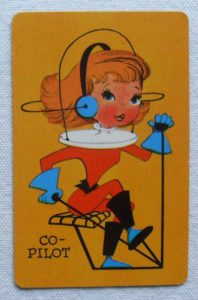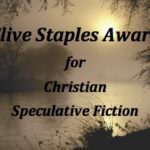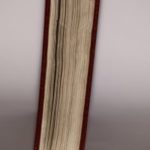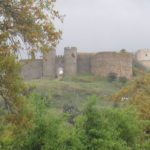You Write Like A Girl
 There was a minor brouhaha in the science fiction world last week. It went something like this:
There was a minor brouhaha in the science fiction world last week. It went something like this:
1. The table of contents for Solaris Rising, an annual SF anthology from a British publisher, was posted.
2. Someone noticed there were only a couple of stories by female authors on the list.
3. Accusations of gender bias were leveled at the editor.
4. Flame war ensued.
5. After the smoke cleared, the general consensus was that the editor wasn’t, at least consciously, guilty of gender bias against female authors, but there was a larger problem of sexism in science fiction publishing, a genre where women have had less success getting published and winning awards than men (Some strong language in these linked posts).
So, how about us? Do we have the same problem in Christian science fiction? We’ve talked a lot here about a perceived feminine domination of Christian fiction in general, but does that extend into Christian speculative fiction–specifically science fiction? Or, is that flavor of literature as much a gentleman’s club for Christian writers as it seems to be for secular writers?
I’m curious. I’m occasionally told that I write like a girl. I plugged an excerpt from my novel into one of those writing style analysis programs, and it said I write like Margaret Atwood, author of The Handmaid’s Tale. I’ve even considered submitting to a couple of ladies-only anthologies under a female pen name, just to see if I could pass. Hey, it worked for the Bronte sisters…
The gender-bias issue seems like a two-edged sword. There may very well be a subtle prejudice against women writers among science fiction publishers, but that also makes successful women science fiction writers a minority, and for that reason, a little exotic–a little more interesting. When’s the last time you saw an anthology explicitly dedicated to stories from bald, middle-aged men living in the Midwest U.S.?
Yeah, me neither.







































Let me know when this “exotic” and “interesting” attitude to successful women science fiction authors extends to more anthologies of SF written by women and the development of more successful women SF authors. It hasn’t happened yet, and women like Mary Shelley and C.L. Moore and James Tiptree Jr. a.k.a. Alice Sheldon have been writing SF since the beginning.
So the other edge of that two-edged sword seems a little blunt, to me — and I wouldn’t be at all surprised if in fact there IS an anthology dedicated to stories from bald, middle-aged men living in the Midwest US, even if by accident rather than design. Now if you were going to narrow it down to guys named Fred… now that would be exotic. 🙂
R.J.: Well, I certainly find them both interesting and exotic. Unfortunately, I’m not a publisher. In my experience, science fiction written by and about women asks and answers different questions, and if I’m looking for something fresh and innovative, it’s likely I’ll try something by a female author first. I think the fact that we perceive a need to create women-authors-only anthologies implies that women have a distinctive voice within the genre that deserves more exposure. Whether the SF establishment is trying hard enough to make it happen–that seems to be the issue.
Another question is how to define the tipping point–what constitutes enough parity between male and female authors to make charges of gender bias no longer credible? A 50% female to male ratio? 51%? Some commenters opined that the problem may not be bias so much as interest–women may simply not enjoy writing science fiction as compared to other genres. Perhaps it doesn’t provide the proper backdrop for the issues they want to explore or its conventions are too restrictive.
In the interest of full disclosure, somebody did just issue an anthology of short stories by a bald-headed Midwesterner named Fred.
You wrote:
In my experience, science fiction written by and about women asks and answers different questions…
I agree — I’m more likely to be interested in SF written by women because it seems more likely to deal with the philosophical, psychological, and sociological aspects of scientific advances or discoveries — the human factor — rather than focusing on the nuts and bolts (or just the basic fact) of the advance or discovery itself. I really don’t care for a lot of details on how a particular planet orbits the sun or how a new ship’s faster-than-light drive works. I don’t even really care about how those things were discovered. But I do want to know how those things affect the people involved.
I don’t think there needs to be a 50% ratio of female to male writers in SF, but I do think there’s room for more acknowledgement of and interest in writing by women, and less prejudice against it by some readers (not just male readers, but sometimes female as well) that assume SF written by women is going to be petty and “domestic” or full of schmaltzy romance.
You know, I really don’t pay attention to the gender of the authors I read. I’m kinda strange like that. xD The whole accusing people of being sexist thing never really made sense to me…
I read people who write things I like. And most of the people who write what I like are men. That’s just how it is.
Hmm, it would seem at least one notable author, responsible for much of the Christian sci-fi scene, happens to be a woman.
But even if that were not the case, I’d suggest that women more than dominate certain other fields of Christian fiction crowding the market. (Disclaimer: I’m not whining about The Publishing Industry again. If that’s what most Christian fiction readers clearly want, then it is their preferences that would need to change first, not publishers.)
Interesting topic, Fred. I’ve thought about this before because I’ve heard all the stats that buyers of Christian fiction are primarily women, yet the membership of the CSFF blog tour is quite balanced. I’m not sure of the numbers at this moment, but we were at one time about 50-50.
Obviously that’s inclusive of fantasy and supernatural stories, not just science fiction, but I’ve thought there’s a greater gender crossover with speculative stories.
One other observation I made when at a Christian writers’ conference: while most of the writers attending were women, most of the editors were men. Hmmmm.
How does it work having men acquire the books that women read, I wonder.
All that being said, I wonder if there isn’t something about the differences in the way men and women’s brains work that draw more men to science fiction. I don’t know if this is still true, but once upon a time more men (percentage wise) were drawn to the sciences in college than women, in contrast to the numbers drawn to the humanities.
I’d be interested in what someone like John Cooke (Ray Gun Revival) has seen in story submissions and even in subscriptions.
Becky
About the differences between mens and womens types of stories –
I’m really not sure if there is a difference.
My kneejerk reaction is to say that women like more emotionally compelling stories while men like blow-em-up hardcore scifi…
But look at Star Wars. (original tril) It’s emotionally compelling and very soft science fiction, and loved by pretty much everyone.
And on the other side of the scale, I read (and mostly liked, except for content issues) Ender’s Game – I found it very interesting, hardcore scifi and all. And many of my friends (mostly girls) are into Star Trek, Doctor Who, Stargate, etc.
So I really don’t know who is into what.
As to writers – I think that while a girl might enjoy a scifi story, it’s not as likely that she’ll write it because the world of science fiction in general is percieved as harsher and more cold than the world of fantasy. Less romantic. (I myself tend to write soft scifi and steampunk fantasy and scifi fantasy, that kind of thing. Really not big into writing technobabble stuff)
I agree with the general consensus that perhaps not as many women write science fiction. I am a woman, and about half of my stories and ideas are science fiction, but I can’t say I write “hardcore” sci fi. I tend more toward the fantasy end of things. Maybe the kind of science fiction I’d write are not the kind die-hard sci fi fans want to read – or put in anthologies.
I wonder what it really means to “write like a girl”, or vice versa. I apparently write “like a guy” – James Joyce is the result I’ve gotten 2 out of 3 times. Hmm.
Oh yes, and about those writing analysis programs – I really want to know how those work because I’ve gotten a wide range of results (from J. K. Rowling to Edgar Allen Poe to a couple of authors I’d never heard of) depending on even what chapter of my work I pasted into the box. (I used the same one that you did, Fred)
And yeah, most of the authors it came up with for me were male authors, with the exception of JK Rowling. <smile>
Haha. I’ll post something more substantial later, but I put “I Write Like” through the same test I did with Sins of the Son, only I used Tiger & Serpent.
Chapter 1, Ajeet’s POV, I got Cory Doctorow (who?)
Chapter 2, Briana’s POV, I got William Shakespeare
And I think I got James Joyce or some other writer I’m not that fond of when I put in Sins of the Son sections awhile back.
All that to say….
I don’t know if “I Write Like” has very many different available results. A friend of mine also got Cory Doctorow (and both of us had the same reaction – “who?”). And you got James Joyce too! (I don’t know who he is either.)
Cory Doctorow: one of the coolest things to come out of Toronto, ever. Feel complimented, gals… 😀
For those questioning whether “you write like a guy/girl” really means anything…
This test is a gender guesser, and when I put in a chunk of one of my books it told me I was “male” (if informal writing) and “weak male” (if formal writing). Ha. http://www.hackerfactor.com/GenderGuesser.php#Analyze
Sorry, I’m kind of comment-bombing this post, aren’t I? I’ll stop now…
Seems like others are trying to draw attention to a diversity of sci fi writers – 10 Diverse Sci-Fi Authors You Should Know. The diversity extends beyond gender to ethnicity and sexual preference. So apparently the ideal is to have a politically correct group of writers represent the genre. 🙄
In Jenni’s first comment, she said she didn’t pay attention to the gender of the authors. I know I never did until I got into the writing profession and learned that the majority of readers are women. Then I started paying attention.
I must admit that I did notice all the authors I listed in a sort of best of recent Christian fiction which I compiled in a post at my site were all men.
Becky
Starting with Fred:
Yeah, I usually point and laugh when women do that. And I am one. Okay, so it’s just a snort.
I’m probably the wrong one to ask a question like this. Even the “girliest” girls I know don’t read “Amish fiction.” Chicklit or women’s fiction, or a contemporary romance, sure. And, far as I can tell, it kinda depends on the sci-fi, I think.
Well, I can’t name an anthology, cuz I don’t read that many. However…I can think of a novel or two, oddly…
In all seriousness, I do think there’ s a cultural bias against men, in general. But that’s me.
RJ: “I agree — I’m more likely to be interested in SF written by women…”
I’m admittedly a bit more the opposite. While I agree I’m interested in how science affects humanity and such, I also have this weird thing where, for whatever reason, most of the writers I read are male. Don’t ask why; I couldn’t tell you. I don’t really notice till later.
Haha. Yeah. But I’ll admit, sometimes I read the back cover copy and think, “Oh, lords….”
But since we’re on the subject, I’m probably the pickiest about female characters, not their writers.
Anyway, my last drive-by comment for the evening is: I heard somewhere that “masculine” and “feminine” writing has more to do with sentence structure. Like, it might look like this:
“Her hand touched the door.” (Feminine, because a body part is doing the action rather than the person. I don’t quite get that one; I’d have to look up the reference.)
“His mind was preoccupied by baseball.” (Feminine, because it’s passive voice.)
“She touched the door.” (Masculine, because it’s very active tense.)
“He ignored the sound.” (Masculine, because it uses a strong, active verb.)
So, basically, the idea was that the stronger and more active your verbs, the more masculine the writing was; and the weaker and more passive your verbs, the more feminine.
Now that might give someone a field day. hehe.
Edit: Sorry, Bethany, I didn’t read the link till just now. Everyone else, that’s what I was trying to explain.
Hmm, but I use a lot of both those kinds of sentence structures, and primarily the “feminine” ones. I guess I do try to use strong, active verbs.
I think the grid itself has a bit of a gender bias associated with it…so yeah.
I use the initials “C.L.” for deliberate gender neutrality purposes, actually. It was a decision I made when I began to focus more on speculative. It’s also more subject to consistent spelling than “Cathi-Lyn”…
All that aside, I wonder if this issue is linked to common wisdom about women and the sciences–it’s something girls are said to do less of, statistically, for a variety of (apparently cultural) reasons.
Interesting theory about the passive and active verbs. I’d always heard that was a matter of training–that beginning writers tend to use passive construction more than experienced ones. I get male/weak male on the gender guesser too, for whatever that’s worth.
But, I’m probably the wrong demographic to go by for any of this stuff as well. I have a bad habit of telling people I don’t work with erotica, gore horror or inspirational romance.
Interesting concept.
Not to beat the proverbial dead horse here, but somebody finally turned up with some data on this issue, which is hotter in the UK now than in the US: http://www.cheryl-morgan.com/?p=11096